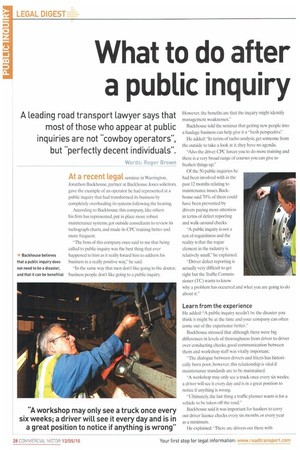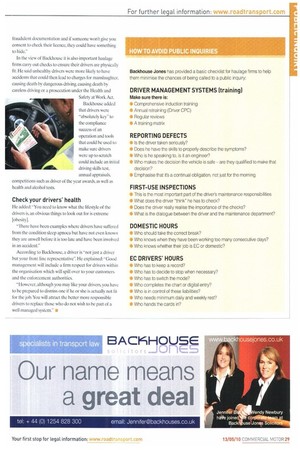What to do after a public inquiry
Page 28

Page 29

If you've noticed an error in this article please click here to report it so we can fix it.
A leading road transport lawyer says that most of those who appear at public inquiries are not "cowboy operators", but "perfectly decent individuals".
Words: Roger Brown At a recent legal seminar in Warrington, Jonathon Backhouse, partner at Backhouse Jones solicitors, gave the example of an operator he had represented at a public inquiry that had transformed its business by completely overhauling its systems following the hearing.
According to Back house, this company, like others his firm has represented. put in place more robust maintenance systems. got outside consultants to review its tachograph charts, and made its CPC training better and more frequent.
"The boss of this company once said to me that being called to public inquiry was the best thing that ever happened to him as it really forced him to address his business in a really positive way," he said.
"In the same way that men don't like going to the doctor, business people don't like going to a public inquiry. However, the benefits are that the inquiry might identify management weaknesses."
Backhouse told the seminar that getting new people into a haulage business can help give it a "fresh perspective': He added: "In terms of tacho analysis, get someone from the outside to take a look at it, they have no agenda.
-Also the driver CPC forces you to do more training and there is a very broad range of courses you can give to freshen things up."
Of the 50 public inquiries he had been involved with in the past 12 months relating to maintenance issues. Backhouse said 70% of them could have been prevented by drivers paying more attention in terms of defect reporting and walk-around checks.
"A public inquiry is not a test of roguishness and the reality is that the rogue element in the industry is relatively small," he explained.
"Driver defect reporting is actually very difficult to get right but the Traffic Commissioner (TC) wants to know why a problem has occurred and what you are going to do about it."
Learn from the experience He added: "A public inquiry needn't be the disaster you think it might be at the time and your company can often come out of the experience better."
Backhouse stressed that although there were big differences in levels of thoroughness from driver to driver over conducting checks, good communication between them and workshop staff was vitally important.
"The dialogue between drivers and fitters has historically been poor, however, this relationship is vital if maintenance standards are to be maintained.
"A workshop may only see a truck once every six weeks; a driver will see it every day and is in a great position to notice if anything is wrong.
"Ultimately, the last thing a traffic planner wants is for a vehicle to be taken off the road."
Backhouse said it was important for hauliers to carry out driver licence checks every six months, or every year as a minimum.
He explained: "There are drivers out there with fraudulent documentation and if someone won't give you consent to check their licence, they could have something to hide."
In the view of Backhouse it is also important haulage firms carry out checks to ensure their drivers are physically fit. He said unhealthy drivers were more likely to have accidents that could then lead to charges for manslaughter.
causing death by dangerous driving, causing death by careless driving or a prosecution under the Health and Safety at Work Act.
Backhouse added that drivers were "absolutely key" to the compliance success of an operation and tools that could be used to make sure drivers were up 10 scratch could include an initial driving skills test, annual appraisals,
competitions such as driver of the year awards, as well as health and alcohol tests.
Check your drivers' health
He added: -You need to know what the lifestyle of the drivers is, an obvious things to look out for is extreme [obesity].
"There have been examples where drivers have suffered from the condition sleep apnoea but have not even known they are unwell before it is too late and have been involved in an accident."
According to Backhouse, a driver is "not just a driver but your front line representative". He explained: "Good management will include a firm respect for drivers within the organisation which will spill over to your customers and the enforcement authorities.
"However, although you may like your drivers, you have to be prepared to dismiss one if he or she is actually not fit for the job. You will attract the better more responsible drivers to replace those who do not wish to he part of a well managed system."
































































































































